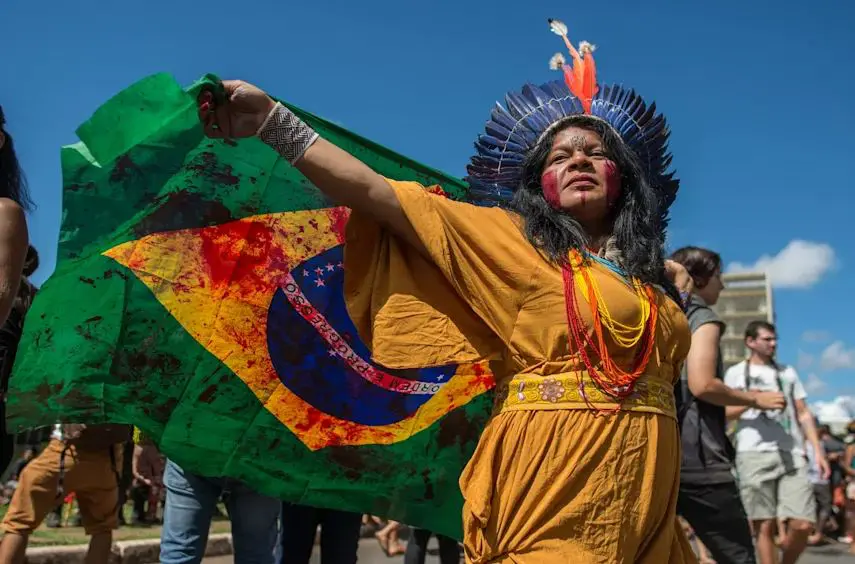Climate change is one of the most pressing challenges of our time, with far-reaching consequences for both the environment and human societies. However, not all communities experience its impacts equally. While everyone is affected by the warming planet, marginalized groups—particularly Indigenous peoples—are often hit the hardest. Facing the dual threats of climate change and exploitative industries like factory farming, Indigenous communities across the world are leading powerful movements to protect their land, culture, and future. These communities, which have long been at the forefront of environmental conservation and sustainability, are now fighting not just for survival but for the preservation of their ways of life.
The Overarching Impact of Climate Change on Indigenous Communities
Indigenous peoples are among the most vulnerable to the effects of climate change. Defined as the original inhabitants of a region, Indigenous communities have historically been linked to their land and have developed sophisticated systems for managing natural resources. Unfortunately, these deep connections are increasingly threatened by climate-related events, such as extreme weather conditions, droughts, floods, and changing ecosystems. For many Indigenous communities, their traditional ways of life—ranging from agriculture to fishing to hunting—are under siege as climate change disrupts these delicate balances.
For example, in the Arctic regions, warming temperatures are melting the ice sheets that many Indigenous communities rely on for hunting and fishing. In tropical regions, severe storms and flooding destroy homes and agricultural land, displacing entire communities. In the Amazon, deforestation and changing rainfall patterns are endangering the survival of communities that rely on the forest for food, water, and shelter.
Climate change is not just an environmental issue—it is a social and cultural crisis for Indigenous peoples. Many communities face the loss of their ancestral lands and traditional practices, which are central to their identity and survival. Indigenous peoples are also disproportionately affected by the economic consequences of climate change, including higher rates of food insecurity, increased health risks, and the destruction of livelihoods.

Factory Farming: An Environmental and Social Threat
One of the most harmful industries exacerbating both climate change and the suffering of Indigenous communities is factory farming. This industrial system, designed for mass-scale animal production, is a leading contributor to environmental degradation. Factory farms are responsible for significant greenhouse gas emissions, deforestation, water pollution, and biodiversity loss. In many cases, factory farming takes place on lands that were once part of Indigenous territories, displacing Indigenous peoples and destroying ecosystems that are crucial for their way of life.
In countries like the United States, Canada, and Brazil, factory farms often expand into rural and Indigenous areas where land and resources are cheap, and regulations are weak. These operations typically clear vast tracts of land to grow animal feed, displacing wildlife and traditional agricultural practices. In regions like the Amazon, industrial agriculture—including factory farming—is one of the primary drivers of deforestation, threatening both biodiversity and the livelihoods of Indigenous peoples who have lived in the rainforest for centuries.
Factory farming also pollutes local waterways with excess nutrients, chemicals, and animal waste, which can contaminate drinking water and destroy aquatic ecosystems. For Indigenous communities that rely on these waterways for fishing and sustenance, this pollution poses a grave threat to their health and cultural practices.

Indigenous Activism and Resistance
Despite the overwhelming odds, Indigenous communities are not passive victims of climate change and factory farming—they are actively resisting these forces and fighting for justice. Across the world, Indigenous activists are leading movements to protect their land, uphold their cultural practices, and demand recognition of their rights.
In the United States, for example, Indigenous groups like the Standing Rock Sioux Tribe have led successful campaigns to stop the construction of pipelines that would endanger their land and water. These actions highlight the deep connection that Indigenous peoples have to the land and their willingness to fight for environmental justice.
Similarly, in Brazil, Indigenous communities are pushing back against the encroachment of factory farms and industrial agriculture into the Amazon rainforest. These communities are advocating for the protection of their ancestral lands and are calling for the recognition of Indigenous knowledge as a vital tool in the fight against climate change. Indigenous leaders have long understood the importance of preserving ecosystems and biodiversity, and they are now pressing for policies that incorporate their traditional knowledge into environmental decision-making.
The Role of Indigenous Knowledge in Climate Solutions
One of the key strengths of Indigenous resistance lies in the wealth of traditional knowledge that these communities possess. Indigenous peoples have lived sustainably with the land for thousands of years, using farming, hunting, and fishing practices that prioritize ecological balance. As the climate crisis worsens, there is a growing recognition that Indigenous knowledge is essential for finding long-term solutions to environmental challenges.
For example, Indigenous-controlled lands are often better protected from deforestation and environmental degradation than lands controlled by governments or corporations. In Canada, Indigenous-led conservation efforts have helped protect vast areas of wilderness, while in Africa, Indigenous land management practices have supported biodiversity and soil health for generations. By recognizing and supporting Indigenous leadership, the global community can take significant strides toward addressing climate change and reversing environmental destruction.

Moving Forward: Solidarity and Action
The struggles of Indigenous communities are not just their struggles—they are the struggles of all of humanity. Climate change and the destruction of ecosystems affect everyone, but the most vulnerable communities are those who are already on the frontlines, facing the compounded effects of colonization, dispossession, and industrial exploitation. Indigenous peoples, however, have the resilience, knowledge, and leadership to fight back and protect the planet for future generations.
To support Indigenous communities in their fight against factory farming and climate change, we must listen to their voices, respect their rights, and actively engage in solidarity efforts. This includes supporting Indigenous land rights, amplifying their activism, and advocating for policy changes that recognize the importance of Indigenous leadership in environmental decision-making.
Additionally, individuals can contribute by reducing their own carbon footprint, supporting plant-based diets, and taking action against industries that harm the environment, such as factory farming. By joining forces with Indigenous communities, we can create a more just and sustainable future, where the planet—and all its people—can thrive.
In conclusion, Indigenous communities are not only the stewards of the land but also the frontline warriors in the battle against climate change and environmental destruction. Their resistance to factory farming, deforestation, and other exploitative industries is critical for the survival of both their communities and the planet. It is our collective responsibility to support their efforts and ensure that their voices are heard in the global fight for environmental justice.















































